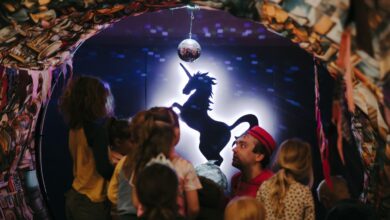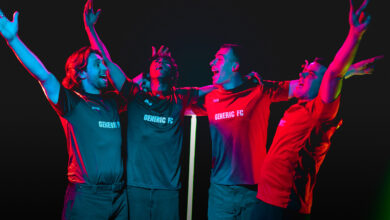Interview: West End Star Kerry Ellis on ‘Murder Ballad’
Dubbed by the press as the ‘First Lady of the West End’, Kerry Ellis is known for taking on some of musical theatre’s biggest roles on the largest West End stages. Though best known for her gravity-defying stint as Elphaba in Wicked, Ellis’ varied musical theatre career has also included Eliza Doolittle in My Fair Lady, Fantine in Les Miserables, Grizabella in Cats, and more. Current London audiences, however, now have the chance to see this leading lady in a much more intimate setting at the Arts Theatre, as she takes on the role of Sarah in the UK premiere of chamber rock musical Murder Ballad. We caught up with this West End star to learn more about the show she calls her ‘dream job’.
Written by Julia Jordan and Julia Nash, Murder Ballad tells the tale of three New Yorkers: Sarah, a wild girl-turned-mum; Michael (Norman Bowman), the man Sarah marries; and Tom (Ramin Karimloo), the man who let her get away. At the end of their sung-through love triangle (which is also narrated by actress Victoria Hamilton-Barrett), one of the three won’t make it out alive. As Ellis explains, ‘It’s a very grey story, as in the topic is just cloudy and messy. But that’s kind of the excitement — I think all the people that come and see it relate to it in some form.’
As the pivotal character of Sarah, Ellis has a particularly exciting journey to play, which, she notes, ‘as an actress to play is so exciting and unusual. [There’s] the fun time Sarah, the young Sarah, and then she moves through meeting her husband, having a child, the heartache of the affair, the excitement of the affair — and then, obviously, the devastation of possibly losing her husband and child. You know, it’s an amazing journey for me to be able to play. And’, Ellis laughs, ‘all in 90 minutes!’
If it seems out of character from her past work, taking on this high-tension show was nevertheless a natural decision for Ellis, who recounts that that when she was approached about the show, it ‘ticked all the boxes’, from the music and story to the fact that it was going to be done at the intimate Arts Theatre space. ‘And that was something new to me and unusual to me,’ Ellis emphasises, ‘because the things I’ve done in the past have been big, huge, glitzy musicals. So to do something so raw and so real in such an intimate venue was something really exciting for me.’
To do something so raw and so real in such an intimate venue was something really exciting . . . [Murder Ballad] ticked all the boxes, massively, for me.
So how has this more unfamiliar experience been for the West End star? ‘It’s fantastic!’ Ellis gushes. ‘We’re having such a great time. The cast is phenomenal, and we’ve just had a really great journey, the rehearsal hall was quite fun and our director Sam Yates has just been a dream to work with, and the cast . . . I mean, I just couldn’t ask for more. It’s been like a dream job.’ Though she hasn’t approached the lesser-known character of Sarah any differently than the iconic roles she’s taken on in the past — ‘I always try and treat everything like a new show,’ Ellis says, ‘and discover it for the first time, so that I can give an honest and true performance to the best of my ability’ — taking on this original piece has been a different sort of experience for her. ‘The show itself is so real and the story is quite dramatic, and intense, and that’s something that’s quite new for me,’ Ellis explains. ‘You know, the other shows I’ve done haven’t been like that — they’ve been either fantasy or set in past times, [whilst] this is just so real, and dealing with such raw issues.’
Murder Ballad, of course, is also a far cry from the lavish nature of the West End spectacles we’ve seen her in before. The show, she explains, is ‘almost like a little bit of groundbreaking musical theatre, I think, because it’s almost like a film on stage. It’s very different, and it’s very fast. The set itself, or the furniture itself, is very basic — there’s a couple of chairs, and a table — and the story is told through the performances and the fantastic direction. And we have an amazing four-piece band as well, that are just brilliant.’
‘I’ve loved, loved, the experience, I’ve loved the challenge,’ Ellis raves when asked about taking her acting chops to the Arts’ smaller stage. ‘I mean obviously I’ve done my own concert in those kind of sized theatres, so it’s not that it was completely alien to me, but [it’s] interesting to do a show where I’m being somebody else in that kind of environment. I think the Arts is an amazing place. Its location is fantastic, and I think the atmosphere that the theatre brings is brilliant. It’s a bit rustic and it’s really fun, and I love the fact that there’s a little bar out front, and it’s really quite basic in a way, which is kind of the beauty of it. There’s so much charm in that theatre, and we all love working there.’
[Murder Ballad] is almost like a little bit of groundbreaking musical theatre, I think, because it’s almost like a film on stage . . . the story is told through the performances and the fantastic direction.
And whilst she sings the praises of long-running hits like Les Mis and Phantom of the Opera, Ellis makes it clear that supporting these smaller theatres and the new work they produce is an important part of London’s theatre scene. ‘The industry is trying now to turn over new shows and new work, which is incredibly exciting. It’s tough’ — Ellis acknowledges — ‘of course, it’s a hard time to take a chance on a new musical that nobody knows anything about, and discovering new art is tough. And people are taking those risks, but they are a little bit few and far between, because of the risk itself. But we’ve got a lot more new spaces now, like the St. James Theatre, and Traf[algar] Studios, Charing Cross Theatre — there’s so many places that put new shows on and support new work. But I do think we have a good turn over of shows, and we’re very lucky, and let’s hope that people keep supporting new work. And if they do get a chance to go to the theatre, not always to bank on the big musicals, to take a chance on the smaller ones that are perhaps new.’
When it comes to her future plans, Ellis says that she’d ‘love to’ take on another show at a smaller venue, and also mentions her excitement about getting involved with this influx of new work. ‘What’s exciting for me at the moment is new writing and new musicals, and I’m enjoying the creation side of it,’ Ellis explains. ‘So I might like to do a couple of plays next, or something where I get to create and get to do something a bit more real. Because I just love, I love the experience.’ Fans of the classic musical theatre canon need not worry though — Ellis also has plenty of dream roles that she’d like to play in the future, including roles that she’s still yet to age into like Norma Desmond in Sunset Boulevard and Mama Rose in Gypsy.
In the meantime, however, this leading lady has plenty on her plate once Murder Ballad concludes its run on 3 December. ‘It’s a pretty busy time coming up!’ Ellis agrees. Fans can see her later this December on tour with frequent collaborator Brian May, as well as performing in a few orchestral Christmas concerts around the holidays. Next spring will see the release of Ellis’ next album, whilst fans wanting to see her back onstage can look forward to an upcoming stint in the UK tour of the Frank Wildhorn musical Wonderland, where she’ll play a grown-up version of Alice in Wonderland in several venues. Much like her current role, it seems that Kerry Ellis has an exciting journey ahead of her as well.
Murder Ballad plays at the Arts Theatre through 3 December. Tickets are available here.






